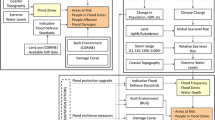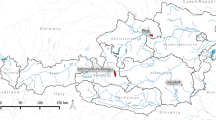Abstract
Interactive tools developed within the RegIS project for assessing the impacts of flooding provide information to support flood management policies and analyse the performance of possible adaptation activities to climate change. This paper describes the methodologies used in the development of these tools including tidal and fluvial flooding processes with different levels of climate pressures, represented by changes in sea level and peak river flows. Potential impacts of climate change for East Anglia and North West England are explored to the 2050s using four socio-economic scenarios to represent plausible futures. This includes changes in urban land use as well as adaptive responses to flooding comprising dike upgrade and realignment options. The results indicate that future climate will increase flood risk in both regions. East Anglia is more vulnerable to climate change than North West England at the present level of protection, especially in the extensive coastal lowlands of the Fens and Broads because of the combined effects of sea-level rise and increased fluvial flows. Although the present adaptive policy of upgrading defences in East Anglia will reduce the impacts of flooding, this policy is not effective in the case of the more extreme climate change scenarios by 2050s. In this case, more extensive adaptation would be required.
Similar content being viewed by others
References
Arnell NW, Reynard NS (1996) The effects of climate change due to global warming on river flows in Great Britain. J Hydrol 183 (3–4):397–424
Audsley E, Pearn KR, Simota C, Cojocaru G, Koutsidou E, Rounsevell MDA, Trnka M, Alexandrov V (2006) What can scenario modelling tell us about future European scale land use, and what not? Environ Sci Policy 9:148–162
Bayliss A (1999) Flood estimation handbook vol. 5: catchment descriptors. Institute of Hydrology, Wallingford
Bayliss A, Jones R (1993) Report no. 121—peaks-over-threshold flood database: summary statistics and seasonality. Institute of Hydrology, Wallingford
Berry PM, Rounsevell MDA, Harrison PA, Audsley E (2006) Assessing the vulnerability of agricultural land use and species to climate change and the role of policy in facilitating adaptation. Environ Sci Policy 9:189–204
Boorman DB, Hollis JM, Lilly A (1995) Hydrology of soil types: a hydrologically based classification of the soils of the UK. Institute of Hydrology Report No. 126, Wallingford
Burton I, Smith JB, Lenhart S (1998) Adaptation to climate change: theory and assessment. In: Feenstra JF, Burton I, Smith JB, Tol RSJ (eds) Handbook on methods for climate change impact assessment and adaptation strategies. UNEP
Church JA, Gregory JM, Huybrechts P, Kuhn M, Lambeck K, Nhuan MT, Qin D, Woodworth PL (2001) Changes in sea level. In: Houghton JT, Ding Y, Griggs DJ, Noguer M, Van der Linden PJ, Xiaosu D (eds) Climate change 2001. The scientific basis. Cambridge University Press, Cambridge, pp 639–693
Cunderlik J, Burn D (2002) Analysis of the linkage between rain and flood regime and its application to regional flood frequency estimation. J Hydrol 261:115–131
Dixon MJ, Tawn JA (1997) Spatial analyses for the UK coast. Proudman oceanographic laboratory internal document No. 112. Proudman Oceanographic Lanoratory, Birkenhead
Draper N (1992) Straight line regression when both variables are subject to error. Conference on applied statistics on agriculture at Kansas State University, 1991. pp 1–18
Entec UK Limited (2005) Making communities sustainable; managing flood risks in the government’s growth areas. Final Technical Report, Report to Association of British Insurers, 2 vols
Evans E, Ashley R, Hall J, Penning-Rowsell E, Saul A, Sayers P, Thorne C, Watkinson A (2004a) Foresight future flooding. Scientific summary: volume I—future risks and their drivers. Office of Science and Technology, London
Evans E, Ashley R, Hall J, Penning-Rowsell E, Saul A, Sayers P, Thorne C, Watkinson A (2004b) Foresight future flooding. Scientific summary: volume II—managing future risks. Office of Science and Technology, London
FCDPAG3 (1999) Flood and coastal defence project appraisal guidance, vol. 3. Economic appraisal. Defra publications ref. PB 4650
Hall JW, Dawson RJ, Sayers PB, Rosu C, Chatterton JB, Deakin R (2003) A methodology for national-scale flood risk assessment. Water Marit Eng 156(WM3):235–247
Hess TM, Morris J (1988) Estimating the value of flood alleviation on agricultural grassland. Agric Water Manag 15:141–153
Holman IP, Rounsevell MDA, Shackley S, Harrison PA, Nicholls RJ, Berry PM, Audsley E (2005a) A regional, multi-sectoral and integrated assessment of the impacts of climate and socio-economic change in the UK Part I. Methodology. Clim Change 71:9–41
Holman IP, Nicholls RJ, Berry PM, Harrison PA, Audsley E, Shackley S, Rounsevell MDA (2005b) A regional, multi-sectoral and integrated assessment of the impacts of climate and socio-economic change in the UK, Part II, Results. Clim Change 71:43–73
Holman IP, Rounsevell MDA, Cojacaru G, Shackley S, McLachlan C, Audsley E, Berry PM, Fontaine C, Harrison PA, Henriques C, Mokrech M, Nicholls RJ, Pearn KR, Richards JA (2008) The concepts and development of a participatory regional integrated assessment tool. Clim Change. doi:10.1007/s10584-008-9453-6
Hulme M, Jenkins GJ, Lu X, Turnpenny JR, Mitchell TD, Jones RG, Lowe J, Murphy JM, Hassell D, Boorman P, McDonald R, Hill S (2002) Climate change scenarios for the United Kingdom. The UKCIP02 Scientific Report, Tyndall Centre for Climate Change Research, School of Environmental Sciences. University of East Anglia, Norwich, UK, pp 120
Intergovernmental Panel on Climate Change (2000) In: Nakicenovic N (ed) Special report on emissions scenarios. Cambridge University Press, Cambridge
Lowe JA, Gregory JM (2005) The effects of climate change on storm surges around the United Kingdom. Philos Trans R Soc London 363:1,313–1,328
Lowe JA, Gregory JM, Flather RA (2001) Changes in the occurrence of storm surges around the United Kingdom under a future climate scenario using a dynamic storm surge model driven by the Hadley Centre climate models. Clim Dyn 18:179–188
Nicholls RJ, Wilson T (2001) Chapter five. Integrated impacts on coastal areas and revir flooding. In: Holman IP, Loveland PJ (eds) Regional climate change impact and response studies in East Anglia and North West England (RegIS). Final Report of MAFF project no. CC0337. (downloadable at www.ukcip.org.uk)
Nicholls RJ, Hoozemans FMJ, Marchand M (1999) Increasing flood risk and wetland losses due to global sea-level rise: regional and global analyses. Glob Environ Change 9:69–87
Organization for Economic Co-operation and Development (1993) OECD core set of indicators for environmental performance reviews. OECD Environment Monographs No. 83. OECD, Paris. http://www.virtualcentre.org/in/dec/toolbox/Refer/gd93179.pdf
Penning-Rowsell EC, Johnson C, Tunstall SM, Tapsell SM, Morris J, Chatterton JB, Coker A, Green C (2003) The benefits of flood and coastal defence: techniques and data for 2003. Flood Hazard Research Centre, Middlesex University, London
Prudhomme C, Jakob D, Svensson C (2003) Uncertainty and climate change impact on the flood regime of small UK catchments. J Hydrol 277(1–2):1–23
Rapport D, Friend A (1979) Towards a comprehensive framework for environmental statistics: a stress-response approach. Statistics Canada, Ottawa
Reynard NS, Prudhomme C, Crooks SM (2001) The flood characteristics of large UK rivers: potential effects of changing climate and land use. Clim Change 48(2–3):343–359
Richards JA, Mokrech M, Berry PM, Nicholls RJ (2008) Regional assessment of climate change impacts on coastal and fluvial ecosystems and the scope for adaptation. Clim Change. doi:10.1007/s10584-008-9451-8
Ricker WE (1973) Linear regressions in fishery research. J Fisheries Res Board Canada 30:409–434
Robson A, Reed D (1999) Flood estimation handbook vol. 3: statistical procedures for flood frequency estimation. Institute of Hydrology, Wallingford
Shackley S, Deanwood R (2003) Constructing social futures for climate-change impacts and response studies: building qualitative and quantitative scenarios with the participation of stakeholders. Clim Res 24:71–90
Shackley S, Wood R (2001) Chapter 4: the RegIS socio-economic scenarios. In: Holman IP, Loveland PJ (eds) Regional climate change impact and response studies in East Anglia and North West England (RegIS). Final Report of MAFF project no. CC0337, pp 31–53
Shennan I, Horton B (2002) Holocene land- and sea-level changes in Great Britain. J Quat Sci 17(5–6):511–526
Smit B, Pilifosova O, Burton I, Challenger B, Huq S, Klein R, Yohe G (2001) Adaptation to climate change in the context of sustainable development and equity. In: McCarthy J, Canziana O, Leary N, Dokken D, White K (eds) Climate change 2001: impacts, adaptation, and vulnerability. Cambridge University Press, Cambridge, pp 877–912
Thorne C, Evans E Penning-Rowsell E (eds) (2006) Future flooding and coastal erosion risks. Thomas Telford London, UK, 350 pp
UK Climate Impacts Programme (2001) Socio-economic scenarios for climate change impact assessment: a guide to their use in the UK. Climate Impacts Programme. UKCIP, Oxford, p 123
UK Climate Impacts Programme (2002) Climate change scenarios: implementation for flood and coastal defence: guidance for users. R&D Technical Report W5B-029/TR. http://www.ukcip.org.uk/scenarios/
Author information
Authors and Affiliations
Corresponding author
Rights and permissions
About this article
Cite this article
Mokrech, M., Nicholls, R.J., Richards, J.A. et al. Regional impact assessment of flooding under future climate and socio-economic scenarios for East Anglia and North West England. Climatic Change 90, 31–55 (2008). https://doi.org/10.1007/s10584-008-9449-2
Received:
Accepted:
Published:
Issue Date:
DOI: https://doi.org/10.1007/s10584-008-9449-2




